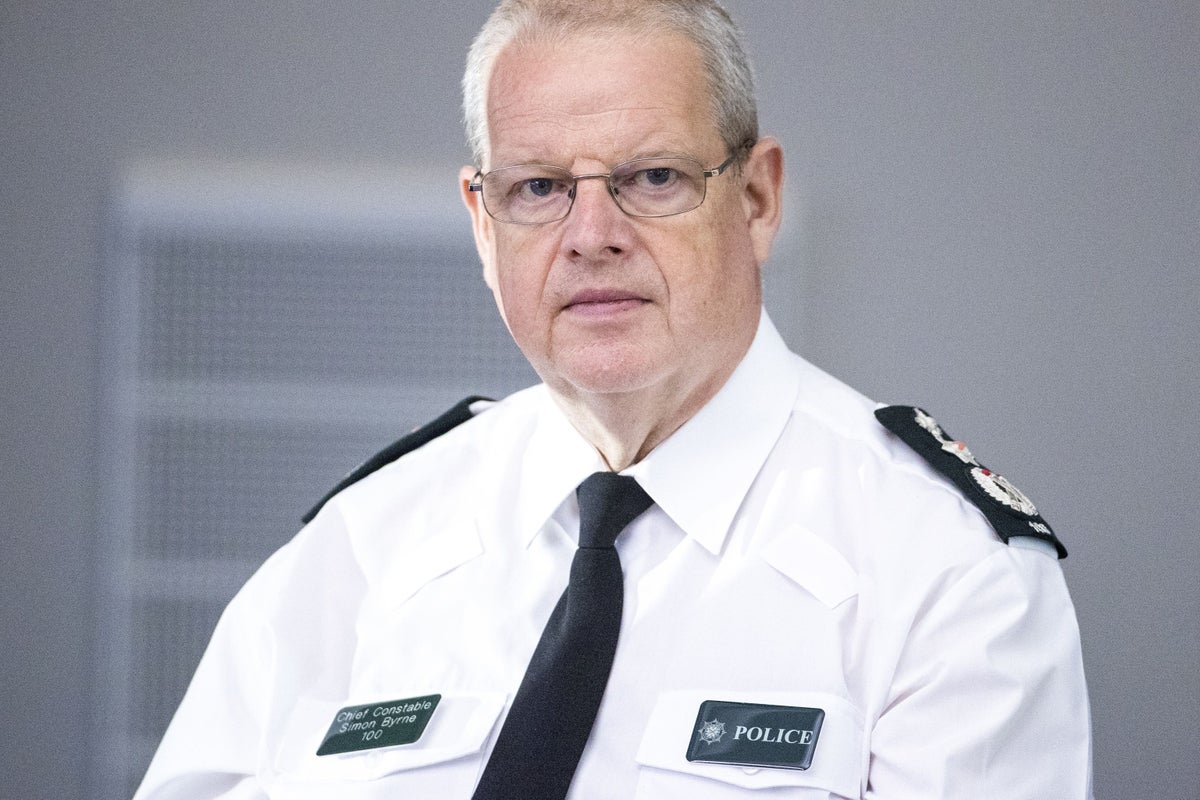
Northern Ireland’s chief constable has warned that his force will shrink to its lowest levels since the PSNI was founded because of a funding shortfall.
Simon Byrne said there will be fewer officers, fewer vehicles, postponed building maintenance and a potential delayed response to calls.
Briefing his officers and staff on Thursday, Mr Byrne said the Police Service of Northern Ireland will have a funding shortfall of £80 million by March, with larger shortfalls to come in the years ahead.
He said as a result the PSNI will shrink over the next three years.
“By March there will be 309 fewer police officers and 115 fewer staff, a reduction of nearly 6%,” he said.
“We will then have 6,699 full-time officers. This is 800 officers fewer than the commitment made in the New Decade, New Approach Agreement and the lowest officer numbers since the Police Service of Northern Ireland was formed.”
Mr Byrne said with a growing population and increasing workloads, police are already having to make difficult choices every day to minimise the risk to the public and to reduce the harm these reductions pose.
He said police will protect core emergency incident responses, continue neighbourhood policing, and protect areas of risk such as domestic abuse, sexual crime and child abuse.
There are no planned redundancies.
The message we delivered today is a bleak one. Inevitably with less police there will be less policing— Simon Byrne, PSNI chief constable
However, he said non-emergency calls may take longer to answer, capacity to investigate crime may be reduced, neighbourhood policing will shrink, there will be reduced road policing and they will review access to and closure of stations.
He also warned that police ability to respond to public disorder may be reduced.
By March, there will be 75 fewer neighbourhood police officers, 96 fewer detectives investigating murder, terrorism, drugs and organised crime, and 97 fewer officers in the Operational Support Department, which includes Roads Policing and specialist search/public order teams of the Tactical Support Groups (TSGs).
There will also be 115 fewer police staff across a range of roles, a reduced vehicle fleet, damaged or broken police vehicles will wait longer for service or repair, and building and maintenance work on the police estate and other modernisation plans – digital and estate – will be deferred.
“The message we delivered today is a bleak one. Inevitably with less police there will be less policing,” he told officers and staff.
“In spite of this, as a police service, our core work will not change. The public can continue to have confidence that we will still answer 999 calls quickly, we will continue to patrol our neighbourhoods, we will continue to investigate high harm crime and bring offenders to justice.
“As far as possible we have minimised the impact on service delivery in 2022, but through 2023 these reductions will have real and noticeable impacts. These will be felt in communities across Northern Ireland.
“While there will be no redundancies, all parts of the police service are going to see significant change in the coming months as we restructure to minimise the risk to service delivery in priority areas. Working alongside our staff associations and trade unions the Service Executive Team will do all we can to support officers and staff in the coming months. Officer and staff welfare and wellbeing will remain a priority.”
Mr Byrne insisted he does not intend to cause alarm, but wants to make the situation clear to colleagues and the public in terms of changes they may see.
“We will continue to serve the people of Northern Ireland with professionalism and remain committed to delivering a visible and impartial human rights-based policing service,” he said.
“We will continue to protect the public in Northern Ireland to the very best of our ability.”
Policing Board chair Deirdre Toner said the board has been deeply concerned about the funding shortfall and the implications.
“The board fully supported the chief constable in seeking to secure an improved financial settlement from the Department of Justice for the police service,” she said.
“However, without additional monies, the outworkings of budgetary pressures on officer and staff numbers has now been outlined in stark detail along with an assessment of the extent of the impact across a range of areas.
“The chief constable and his leadership team have worked to protect key areas, but the service assessment is clear that these levels of reductions will undoubtedly be felt within policing, within partner agencies and within particular aspects of service delivery to the community. These will only become fully known as we go forward.
“Despite the reductions confirmed, it is important to note that there is still a significant resource available to policing in Northern Ireland so the board, like the chief constable, would want to assure the public of the commitment within policing and within the board to doing the best with what we have. We are all very aware of the importance of policing within our community, and the wide range of work that the service delivers.
“Whilst today’s announcement confirms a position we hoped could have been avoided, our focus now has to be on continuing to work with the chief constable and his team on minimising the organisational risks to policing going forward, along with supporting the change and restructuring now required as a result of these financial pressures.”







